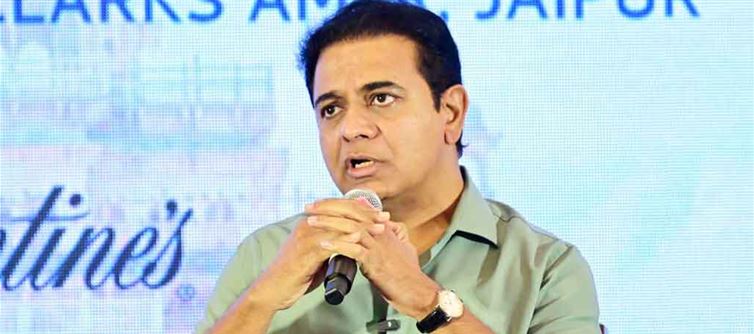
The upcoming delimitation process has raised concerns, according to BRS working president KT Rama Rao, who warned that the southern states—which spearheaded India's family planning initiatives—run the possibility of suffering significant losses in parliamentary representation. He maintained that it went against cooperative federalism's tenets to reward states with unbridled population growth while penalizing those that imposed population control.
Speaking at the ninth edition of the Talk Journalism conference on "North-South Divide in indian Politics" in jaipur on Sunday, Rama Rao claimed that effective family planning had caused South India's population to decline from 26% in 1948 to 19%, while the population of northern indian states like Uttar Pradesh increased by 239 percent during that time.
He questioned, "Is it just that Uttar Pradesh, which failed in this area, gains more clout at the Center, while Kerala, which adopted population control for the good of the country, should now lose seats?"
He cautioned that an excessive concentration of power in northern states with large populations, particularly Uttar Pradesh, could have a negative impact on the federal system. He demanded that current parliamentary seats be frozen and that State Assemblies be given greater representation, saying that "southern aspirations will be ignored if the prime minister is decided solely by numbers from one State."
The former minister, who was criticizing the BJP-led Centre, claimed that the ap Reorganisation Act's pledge to expand the number of mla seats in telangana and andhra pradesh had not yet been met. However, for political reasons, more seats were added in assam and Jammu & Kashmir. He declared, "We don't think the bjp government will redraw constituencies fairly."
Rama Rao also criticized attempts to enforce hindi, describing them as a "arrogance of brute strength," and emphasized that India's diversity is what makes it unique. He said that although hindi is one of the 22 recognized languages, it is not a national language. We can only be bound by our Indianness. Hindi cannot be imposed as a national language, he added, adding that dialects, cuisine, and language change every 250 kilometers. He made it clear that india does not require a national language and that it is the people's right to study any language.
Speaking at the ninth edition of the Talk Journalism conference on "North-South Divide in indian Politics" in jaipur on Sunday, Rama Rao claimed that effective family planning had caused South India's population to decline from 26% in 1948 to 19%, while the population of northern indian states like Uttar Pradesh increased by 239 percent during that time.
He questioned, "Is it just that Uttar Pradesh, which failed in this area, gains more clout at the Center, while Kerala, which adopted population control for the good of the country, should now lose seats?"
He cautioned that an excessive concentration of power in northern states with large populations, particularly Uttar Pradesh, could have a negative impact on the federal system. He demanded that current parliamentary seats be frozen and that State Assemblies be given greater representation, saying that "southern aspirations will be ignored if the prime minister is decided solely by numbers from one State."
The former minister, who was criticizing the BJP-led Centre, claimed that the ap Reorganisation Act's pledge to expand the number of mla seats in telangana and andhra pradesh had not yet been met. However, for political reasons, more seats were added in assam and Jammu & Kashmir. He declared, "We don't think the bjp government will redraw constituencies fairly."
Rama Rao also criticized attempts to enforce hindi, describing them as a "arrogance of brute strength," and emphasized that India's diversity is what makes it unique. He said that although hindi is one of the 22 recognized languages, it is not a national language. We can only be bound by our Indianness. Hindi cannot be imposed as a national language, he added, adding that dialects, cuisine, and language change every 250 kilometers. He made it clear that india does not require a national language and that it is the people's right to study any language.




 click and follow Indiaherald WhatsApp channel
click and follow Indiaherald WhatsApp channel